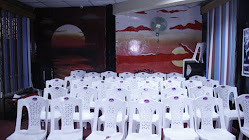Attacked on all sides: Somali civilians bombed by US airstrikes and targeted by al-Shabab
April 22, 2019 · 11:15 AM EDT

A Somali soldier holds
position as civilians evacuate from the scene of a suicide explosion
after al-Shabab militia stormed a government building in Mogadishu, Somalia,
March 23, 2019.
Feisal Omar/Reuters
Three farmers were sleeping under a
tree when they were fatally hit by US airstrikes near the rural town of
Darusalam, Somalia, in November 2017, according to a new report by Amnesty
International.
The farmers were al-Shabab
terrorists — according to the United States Africa Command or AFRICOM, which
leads US military operations in Somalia.
But Amnesty has argued that overly
broad strike criteria are putting young Somali men — some who are farmers
living in remote areas — at risk of being indiscriminately targeted by
airstrikes.
Under a shroud of secrecy, US
military counterterrorism operations in Somalia have surged under
Trump administration, along with a lack of transparency in terms of
civilian casualties.
The US has killed 800 terrorists and
conducted 110 airstrikes in Somalia since June 2017,
according to AFRICOM. Many are in the al-Shabab-controlled areas of Lower and
Middle Shabelle region of the country.
The new report by Amnesty says the US military could be
guilty of war crimes for killing civilians during airstrikes in Somalia. They
documented 14 civilian casualties from just five airstrikes conducted between
2017 and 2018. These casualties were not reported by AFRICOM.
They denied any civilian deaths
until April 5, when AFRICOM acknowledged at least two civilian casualties in
an April 2018 strike after conducting an internal review last month.
"US Africa Command is committed
to transparency in its reporting of civilian casualties. While believed to be
an isolated occurrence, the reporting error is being addressed," AFRICOM
said in the statement.
In an executive order earlier this month, President
Donald Trump revoked an Obama-era policy requiring the government to publish
statistics on civilian casualties.
“The fact that [AFRICOM] says they
are not killing civilians in these airstrikes needs to be questioned."
Abdullahi Hassan, researcher, Amnesty International
“The fact that they say they are not
killing civilians in these airstrikes needs to be questioned,” said Abdullahi
Hassan, a researcher on Somalia at Amnesty International.
Analysts like Hassan worry that the
increased airstrikes and lack of transparency about the civilian cost are
having unintended consequences on the humanitarian and security situation in
Somalia, exacerbating internal displacement and creating the conditions for
radicalizing Somali youth.
Despite the rapidly increasing
airstrikes, al-Shabab continues to orchestrate deadly attacks in the
region.
Between March 21 and March 28, over
40 people were killed in nine explosions in Somalia’s capital of
Mogadishu.

A man stands in the ruins of a
building destroyed in an explosion in Mogadishu, Somalia, March 28,
2019.
Credit:
Feisal Omar/Reuters
Amnesty has called on the US to
investigate the claims, but the military has rejected their findings.
The report has brought intense
scrutiny to the growing secrecy of US airstrikes in Somalia that have
almost tripled since 2017, when President Donald Trump began rolling back Obama-era regulations on airstrikes
that were created to protect civilians.
Airstrikes
spur radicalization
Hours after the US airstrike in
Darusalam killed three farmers, staged photos of the victims were uploaded onto
a known pro-al-Shabab website.
While smartphones have long been banned in areas controlled by al-Shabab, pictures
of civilians allegedly killed in airstrikes are shared on social media by the
terrorist group, often accompanied by text decrying the deaths of Somalis by
foreign actors.
This has worried some analysts, who
expect the propaganda could be used as a tool for recruitment and
radicalization in the future.
“Al-Shabab can use this grievance
[of civilian deaths]. ... If this continues, we can expect more
radicalization."
Roselyne Omondi, associate director of research, Horn
Institute, Nairobi, Kenya
“Al-Shabab can use this grievance,”
said Roselyne Omondi, the associate director of research at the
HORN Institute in Nairobi. Omondi noted how al-Shabab often presents
itself as defending Somalia against foreign intruders. “If this continues, we
can expect more radicalization.”
Similarities have also been drawn to
how US airstrikes in Iraq and Afghanistan were used by militant groups to
radicalize and spread anti-American sentiments.
“It is in the interest of the
terrorist group al-Shabab to untruthfully claim civilian casualties,” AFRICOM
said in a press statement.

Abdihakim Bare Hassan, 27, is a
Kenyan Somali who works for Eastleighwood, a media company that counters youth
radicalization and violence in Kenya and Somalia, April 3, 2019.
Credit:
Halima Gikandi/The World
Abdihakim Bare Hassan says he is not
surprised that al-Shabab is turning civilian casualties from US airstrikes into
online propaganda. The 27-year-old Somali Kenyan works for the media company
Eastleighwood, which uses media and art to counter youth radicalization in
Kenya and Somalia.
Located in the predominantly Somali
Eastleigh neighborhood in Nairobi, known as "Little Mogadishu," the
group trains youth who have been or are currently at risk of gang recruitment
or extremist radicalization.
They receive referrals from police
or local administrators who link the organization with youth identified as
at-risk. Eastleighwood has worked with over 6,000 youth since the group started
in 2011 — the same year Kenya entered Somalia.
Bare Hassan says that at the end of
the day, civilian casualties from airstrikes pales in comparison to those
caused by al-Shabab.
Between 2016 and 2017, the UN documented 4,585 civilians casualties in
Somalia. Sixty percent were attributed to the terrorist group.
“Now they post dead bodies from US airstrikes?”
Bare Hassan said incredulously. “What do you take them for? They kill hundreds
of people every month.”
“I don’t think air strikes will end
this.”
Abdihakim Bare Hassan, Eastleighwood, Nairobi, Kenya
While Bare Hassan is hopeful in the
US military and Somali government, he is skeptical that airstrikes alone will
defeat the terrorist group. “I don’t think airstrikes will end this.”

Pedestrians in the Eastleigh
neighborhood of Nairobi, Kenya. Wednesday, April 3, 2019. The neighborhood has
become a diverse hub for Somali refugees and immigrants, and is often referred
to as "Little Mogadishu."
Credit:
Halima Gikandi/The World
Internally
displaced
In the past two decades, a
combination of prolonged civil war, deadly terrorist attacks, and recurring
drought in Somalia has led to over 2
million internally displaced people in the country. Researchers now
note that foreign-led airstrikes, including those from Kenya, are now
contributing to the problem.
“We are alarmed that the number of
airstrikes in Somalia has sharply escalated this year. ... More airstrikes and
fighting mean more families will flee their homes, and more civilian lives will
be at risk.”
Norwegian Refugee Council statement
“We are alarmed that the number of
airstrikes in Somalia has sharply escalated this year,” said the Norwegian
Refugee Council in a statement. “More airstrikes and fighting mean more
families will flee their homes, and more civilian lives will be at risk.”
According to a United Nations High
Commissioner for Refugees report from November 2017, aerial bombardment and
ground fighting in Lower and Middle Shabelle regions caused more than 10,000
people to flee their homes.
That number has reached a four-year
high, outnumbering those fleeing drought, according to the NRC.
Many of the people interviewed for
the Amnesty report lived in Internally Displaced Persons, or IDP camps, and
were displaced multiple times, including due to air strikes.
“They fled their villages, they fled
their hamlets, they fled their farms. They decided to go to the IDP camps
outside of Mogadishu because they think that’s safer,” Hassan said.
The Somali economy remains primarily
agricultural, and livestock accounts for an estimated 40 percent of the
country’s gross domestic product. While vicious cycles of drought and famine
have plagued the country for years, the areas targeted by US airstrikes are
some of the most fertile areas in the country.
Some researchers are concerned about
the long-term impact of strikes on farming and food security. Especially since
those killed are often the breadwinners for their families.
The United Nations has also recorded how foreign airstrikes have destroyed
livestock and displaced pastoralists.
“Even the animals, the goats, the
sheep, they are also dying because of the strikes,” said Abdiwahab Sheikh
Abdisamad, a Horn of Africa analyst in Nairobi.
“...The farmers fear the air
strikes. They can’t even cultivate because they are not sure what will happen
if they go out to the fields,” Abdisamad said.
“These people are victimized twice.
... They fear al-Shabab, and at the same time they fear the drone strikes.”
Abdullahi Hassan, researcher, Amnesty International
Somalis who flee to IDP camps have
already faced a number of abuses.
“These people are victimized twice,”
Hassan from Amnesty said. “They fear al-Shabab, and at the same time they fear
the drone strikes.”
Amnesty sees AFRICOM’s admission of
error as further proof of the need for more investigations into civilian
casualties in US airstrikes in Somalia.
“Now they know that these kinds of
mistakes were made by their staff," Hassan said. "Now they need to
take all the allegations seriously and investigate properly."
Source: The Global Politics!
Subscribe to:
Post Comments
(
Atom
)


















No comments :
Post a Comment